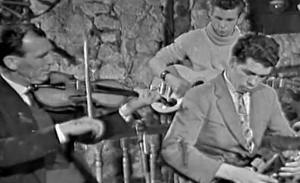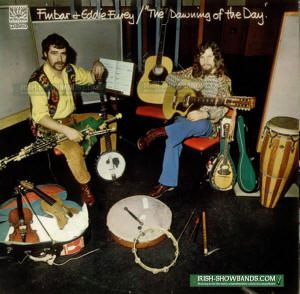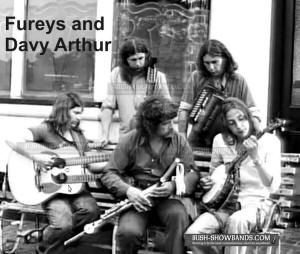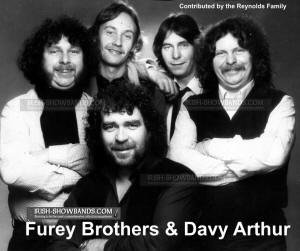Furey Brothers Story (1964-Present)
Photo Gallery -
Band Lineups -
Discography
- Audio samples -
Where Are They Now?
The Story
 The band had it beginnings with their
father, Ted Furey, who was a fiddler of some renown all across
Ireland in the 1950 and 60's and their mother Nora, who played
accordion and banjo. Their family came from the travelling
community, but owned a house in Dublin. In a recent interview on
"For One Night Only," Finbar talked to Gay Byrne about going to the
Puck Fair in County Kerry and buying his first tin whistle when he
was sent to purchase butter by his mother at the age of five. He
spent the day busking at the fair and made a few bob (Irish slang
for schillings) and his path to music was set. It also helps that
your father was an All-Ireland prize winning musician and growing up
in a house filled with music.
The band had it beginnings with their
father, Ted Furey, who was a fiddler of some renown all across
Ireland in the 1950 and 60's and their mother Nora, who played
accordion and banjo. Their family came from the travelling
community, but owned a house in Dublin. In a recent interview on
"For One Night Only," Finbar talked to Gay Byrne about going to the
Puck Fair in County Kerry and buying his first tin whistle when he
was sent to purchase butter by his mother at the age of five. He
spent the day busking at the fair and made a few bob (Irish slang
for schillings) and his path to music was set. It also helps that
your father was an All-Ireland prize winning musician and growing up
in a house filled with music.
Along with their father, Finbar
and his brother Eddie started busking regularly anywhere they could.
Their father was a regular in O'Donoghue's pub in Dublin and was
instrumental is starting the famous traditional music sessions which
started in the late 50's and into the early 60's and eventually lead
to the formation of the Dubliners, featuring Ronnie Drew and Luke
Kelly. Around this time, Finbar got his first set of Uillean pipes
and started entering competitions all around Ireland.
In 1961, he won the All-Ireland
junior championships for pipes. Over the next few years he won many
competitions including three All-Ireland senior medals. Eventually
he was joined by Eddie and they continued to win prizes and also as
a trio with their father.
By 1966, Finbar and Eddie were performing regularly and played the
circuit of folk festivals which launched many traditional musicians
on successful careers back in those days. They won the international
award in Tralee. In 1967, Sean Nos singer Joe Heaney offered the two
Furey lads a tour of the British folk clubs. They went to Scotland
and were soon one of the top acts on the UK folk circuit.
 In September, 1967, Shay Healy
wrote about the two Furey brothers in his folk column in Spotlight magazine saying
they were just as popular in Scotland as they were at home. They had
recently been featured at the Edinburgh Festival which was a major
honour for them. Unfortunately there is little other info about their early career in
Spotlight as folk was not covered very well and also the fact that the Fureys were featuring mainly on the
English and Scottish circuits as opposed to Ireland.
In September, 1967, Shay Healy
wrote about the two Furey brothers in his folk column in Spotlight magazine saying
they were just as popular in Scotland as they were at home. They had
recently been featured at the Edinburgh Festival which was a major
honour for them. Unfortunately there is little other info about their early career in
Spotlight as folk was not covered very well and also the fact that the Fureys were featuring mainly on the
English and Scottish circuits as opposed to Ireland.
In 1968 they released their first
album, the self titled Finbar and Eddie Furey on
Transatlantic Records. In 1969, they released their second album,
The Lonesome Boatman, again on the Transatlantic label. The title
track would become one of the band's best loved songs, played
beautifully by Finbar, who has always been credited as the composer, although on
the original album label, it is listed as a "traditional" song
(we're not sure why). In 2011, Finbar was interviewed by Gay Byrne
and talked about writing the song and how proud it made his father.
That same year, the Clancy
Brothers, who were living in the United States, while touring the
world, suffered a major blow when Tommy Makem announce he was leaving the
group to pursue a solo career. They asked Finbar if he would join as
he played banjo (like Tommy) and tin whistle. Finbar recently said it
was an amazing opportunity for a young musician and he agreed, as
long as he could bring Eddie as well. So, the two brothers supported
the Clancy Brothers. A YouTube video from the American "Mike
Douglas" TV programme has the two lads literally standing behind the
four Clancy brothers (who were wearing their classic white Aran
knit sweaters) while the Fureys were in dark sweaters.
For the next three years the
Fureys toured the world and honed their craft with the Clancy's.
Said Finbar in the RTE documentary, Finbar Furey: Free Spirit, "We
learned so much from the Clancy brothers, their stage performance
was brilliant." They made several albums with the Clancy's but there
was only so much Finbar could take. "There was only so many times
you could sing, I'll Tell Me Ma When I Get Home and I wanted
to play my pipes, but I wasn't playing any pipes." Although Finbar
has said he offered to bring the pipes into the Clancy's stage show,
they declined and his lack of enthusiasm for the band and their
music continued to grow. Eventually he had enough and left the band.
Said Finbar, "I knew that if I stayed there, I would have died
inside."
Finbar and and Eddie returned to
the UK. It was 1972 and they were back on the British folk scene.
They brought out an album, Dawning of the Day which included the
Gerry Rafferty song, Her Father Didn't Like Me Anyway. Finbar
credits the track as being the turning point in their careers.
Legendary BBC DJ, John Peel, made the single his Record of the Year
for 1972, pointing to its extraordinary sound (that of the Uilleann
pipes).
The Furey brother's careers would
be hard hit by the political realities of the times. The "troubles"
in Northern Ireland had escalated after the events of "Bloody
Sunday" and Irish musicians were no longer the darlings of the
British folk set. Finbar and Eddie had to find new places to play
and ended up going to Germany. While in Germany, they made an album,
A Dream In My Hand. Finbar recounts that living in Germany
was not easy and he eventually longed for home. He moved his family
back to Ireland.
 By 1977, Finbar and Eddie knew
that their time as a duo had reached it's limits. In Free Spirit,
Finbar said, "we couldn't have taken the music any further as a duo
and with the instruments we had. The pipes are very limited. It was
amazing that we did so much with them." Around this time, their
brothers, George and Paul, were playing in band called The Buskers
along with Davy Arthur. On a tour of Germany the two groups met up
and it became obvious to all that the brothers should all join
together and the Furey Brothers with Davy Arthur were born.
By 1977, Finbar and Eddie knew
that their time as a duo had reached it's limits. In Free Spirit,
Finbar said, "we couldn't have taken the music any further as a duo
and with the instruments we had. The pipes are very limited. It was
amazing that we did so much with them." Around this time, their
brothers, George and Paul, were playing in band called The Buskers
along with Davy Arthur. On a tour of Germany the two groups met up
and it became obvious to all that the brothers should all join
together and the Furey Brothers with Davy Arthur were born.
They recorded an album for Polydor
called, Morning on a Distant Shore. A single, Shipyard
Slips seems to have been released at the time, but did nothing.
However, the record would be resurrected after their success in 1979
(see below).
They released their first single,
Cover of the New Starlight, a parody of Dr. Hook's hit,
Cover of the Rolling Stone on the Dolphin label. The record got
plays and was considered a bit of an oddity, neither pop nor
traditional and the B-side, Sham Rock, was a somewhat new form of
traditional music which got the boys in trouble with the traditional
purists. Not quite the same as Horslips "trad-rock" genre, Finbar
described the track as more jazz influenced traditional music. This
theme would be carried on in their first album released, Banshee,
also on the Dolphin label.
1979 started with the band needing
a new single. They decided against the Sham Rock genre for their
second release, Scottish born singer Eric Bogle's song, No Man's
Land, which the Fureys renamed, The Green Fields of France.
In the documentary Free Spirit, Finbar recounts how Eddie was
supposed to sing the song, but had been up drinking the previous
night with Luke Kelly of the Dubliners and was unable to perform. As the studio time had been booked and paid for, Finbar
decided he would sing it and the rest, as they say, is history.
Not only was the song a massive
hit in Ireland, but it was banned by the BBC in England as they
thought it referred to the Irish rebellion of 1916. It was also a
hit around the world. Suddenly, the
Fureys were international stars. As Finbar said, "we were living the
life of rock stars." Then, without warning, on the 12th of May,
1979, Ted Furey passed away at
the age of just 65. Devastated, the four brothers came home to
Ireland for the funeral. Finbar played the pipes at his father's
graveside, one of the hardest things he ever had to do. But he felt
his father's death was also a timely warning, not to get too caught
up in the trappings of fame.
The hit record would start a run
of success that few Irish bands have ever matched. At this point,
the band's record label; became Banshee Records, the name of their
first album on Dolphin. We know that the label had ties to Ritz
Records as many of their singles and albums were also released on the
Ritz label. We continue to try and research the relationship
between the two labels.
However, their second single was
actually on the Polydor label from their 1977 album, Morning on a
Distant Shore. It is possible this was left over from their days
in Germany and released to capitalise on their new found fame.
Shipyard Slips reached number 26 on the Irish charts.
 The
Fureys enjoyed enormous commercial success over the next few years.
Hit single followed hit single and their albums are still considered
classics by collectors around the world. In late 1979 they released
Leaving Nancy
which again cracked the top ten, settling at number 6. This was
followed up by the song Finbar had written several years earlier,
The Lonesome Boatman which also reached number 6. Their follow
up, Beer, Beer, Beer appears to have been a nod to the
Clancy's who featured the song prominently while Finbar and Eddie
were with them. and although it only made it to number 18, it was
still a hit.
The
Fureys enjoyed enormous commercial success over the next few years.
Hit single followed hit single and their albums are still considered
classics by collectors around the world. In late 1979 they released
Leaving Nancy
which again cracked the top ten, settling at number 6. This was
followed up by the song Finbar had written several years earlier,
The Lonesome Boatman which also reached number 6. Their follow
up, Beer, Beer, Beer appears to have been a nod to the
Clancy's who featured the song prominently while Finbar and Eddie
were with them. and although it only made it to number 18, it was
still a hit.
After their father's death, Finbar was asked by his mother to look
through his belongings and during the search, he came across a book
of tunes Ted Furey had been collecting since the 1930's. One of
them,
When You Were Sweet Sixteen was familiar to Finbar, although he did
not know all the words. It was originally recorded by George Gaskin
in 1900. On the encouragement of his mother, the Fureys recorded the
80 year old song and were surprised by the massive hit is became.
Not only was an immediate success at home in Ireland, but exploded
in the UK as well. It reached number 14 in the UK Charts and
prompted an appearance on Top of the Pops, one of only a few Irish
acts to appear on the legendary BBC programme.
With their second number one hit, although reeling from the loss of
their father a few years earlier, by the end of 1981, The Fureys
were truly a worldwide phenomenon. As an aside, this would be the
group's last number one record. Finbar would have to wait until 2013
(32 years later) when his song, The Last Great Love Song,
would go to the top of the Irish charts.
The
band's next three singles would also crack the Irish top ten: I
Will Love You (number 4), The Old Man (number 9, written
by Phil Coulter) and Now Is The Hour (number 8). The band's
success seemed to know no bounds as everything they touched seemed
to turn to gold. They were performing for sellout audiences where
ever they appeared and were a mainstay of the Irish festival circuit
during the 1980's.
By
the mid 80's though things were beginning to change. Finbar started
to feel uncomfortable playing the "old hits" and encourage his
brothers to write more new songs, but they seemed quite happy to
tour on their past successes. For quite a while after the death of
their father, Finbar has said that he wanted to remain close to home
and they did not undertake any major tours for a few years. Then,
his mother, suggested that they really should be touring as they had
before. In the documentary, Free Spirit, Finbar discussed not
wanting to leave his mother alone, but realising his father would
want them to keep playing and touring and they reluctantly agreed to
a tour in Australia. While away, Nora sadly passed away and the
brothers again had to travel back to Ireland to bury a parent. It
was the 5th of September, 1986 when Nora died.
Her loss continued to trouble
Finbar and although the band would tour together for another 8
years, he was not happy. When his youngest son, Finbar Jr. was born
in 1994, Finbar decided it was time to leave the band and he left.
The Furey and Davy Arthur continued to tour, but never enjoyed the
success they had with Finbar as the frontman. The had their last hit
record in 1991 and would never make the charts again, although they
would go on to tour regularly.
In 2002, Paul Furey sadly lost his
battle with cancer and passed away. Finbar spent a decade "lost"
after his brother's passing and although he did not play with the
band, he says he was always watching them, always wanting success
for them. Finbar also suffered health problems when years of playing
the pipes lead to a deterioration of the muscles in his arms and the
threat that he might lose the use of his right arm. He underwent
surgery and eventually returned to the stage, writing new songs and
as previously mentioned, enjoying a number one hit in 2013 with his
song, The Last Great Love Song.
The Fureys and Davey Arthur
continue to tour across Ireland, the UK and Europe, playing hundreds
of concert dates a year.
More to come.....
click on thumbnails for full image
